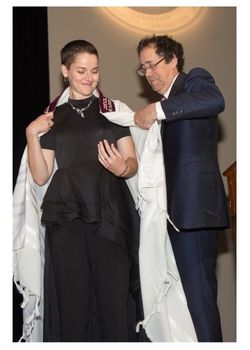 The decision to enter the rabbinate is an exciting and complex one. For those committed to the service of God and devoted to the Jewish people, the rabbinate offers the daily combination of challenge and opportunity infused with personal meaning and spiritual fulfillment.
The decision to enter the rabbinate is an exciting and complex one. For those committed to the service of God and devoted to the Jewish people, the rabbinate offers the daily combination of challenge and opportunity infused with personal meaning and spiritual fulfillment.
While Judaism stresses the importance for every Jew to strive towards fulfillment of Jewish norms, ideals and values, there have always been those who emerge as leaders to help shape the community’s destiny. The term rabbi literally means “my teacher” or “my master”. For many centuries, individuals and communities have looked to the rabbi for teaching, role modeling and leadership.
For centuries after the development of rabbinic Judaism, ‘rabbi’ was used to designate those who had studied Torah and become scholars and experts in the nuances of the written and oral tradition, and who had been ordained or granted smicha by a rabbinic court to serve as a decision-maker, interpreter, and teacher. Today, a rabbi is still a teacher and is still viewed as the master of the tradition, and is also much more. The rabbi of the twenty-first century is also a spiritual guide, pastoral counselor, confidante, writer, manager, administrator, and public speaker.
Becoming a rabbi is not an entry into priesthood nor does it assume any separate status for an individual. In the modern world, the rabbi does often preside over public mitzvot ceremonies which individual Jews do not, however, this is more a result of knowledge and awareness of the practices and not of any sort of ceremonial eligibility. Any knowledgeable Jew can, in fact, lead congregational worship or officiate at lifecycle events. Moreover, neither the rabbi, nor any other individual, is the intermediary between God and humans. Each Jew has his or her own relationship with God, which he or she is responsible for nurturing and maintaining. The rabbi, through his or her own creativity and understanding, transmits the values and norms of the tradition that can ultimately draw others into their own relationship with God through a life of Torah, mitzvot, and good deeds.
At Ziegler, we offer a rigorous academic program that is grounded in the rich traditions of Jewish thought while also addressing the challenges and opportunities of contemporary Jewish life. Our faculty, comprised of renowned scholars and educators, are committed to providing you with a transformative learning experience. Our 4-year program is designed to equip you with the knowledge, skills, and wisdom to inspire and serve Jewish communities worldwide. Upon Ordination, you will receive a Masters of Rabbinic Studies (MARS) degree.
Discover What Makes Ziegler Different:
- A rich tradition of excellence: Benefit from our long-standing reputation for producing exceptional rabbis for over 25 years.
- A personalized approach: We foster a supportive and accessible learning environment for students with attention to diverse learning styles and accommodations.
- A global perspective: Engage with the greater Jewish community and explore the complexities of modern Jewish life.
- A commitment to social justice: Develop a deep understanding of ethical issues and a passion for making a positive impact.
We look forward to the opportunity to guide you on your journey to becoming a rabbi.

